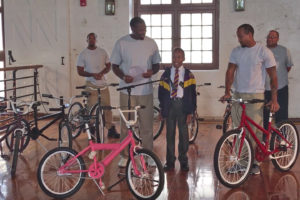Elementary students in Kentucky’s Jefferson County schools are learning that holding a yoga pose requires mental attention and physical poise—skills they also use in the classroom.


Elementary students in Kentucky’s Jefferson County schools are learning that holding a yoga pose requires mental attention and physical poise—skills they also use in the classroom.
More than 10,000 students across 25 Louisville elementary schools are taking part in a six-year pilot project called the Compassionate Schools Project. The project infuses fitness with health education and social and emotional learning in a curriculum aimed at the “whole child,” according to The Hechinger Report.
Students spend two 50-minute sessions a week doing exercises like partner yoga, which encourages students to practice mindfulness, cooperation, and problem-solving with their classmates.
From The Hechinger Report:
Tish Jennings, an associate professor at the University of Virginia’s Curry School of Education, is one of the researchers who developed the curriculum and is studying its impact in Louisville-area schools . . .
Jennings sees whole-child education as critical to student success. Schools can’t focus only on academic content, she said, with students who don’t feel safe and calm in the classroom. Many children experience trauma at home or in their communities. Those experiences don’t disappear when the school bell rings.
Jennings’ study is currently in its fourth year, but Stonestreet Elementary School Principal Donnie Boemker believes he’s already seeing an impact.
Students are recognizing when they’re stressed or angry—through physical cues like tightened shoulders and furrowed brows—and are applying what they learned through the Compassionate Schools Project to keep their cool, he said.
“If you catch it up front, think about your breathing and those calming skills, it’ll help them in the long run,” he said, adding that kids regularly use the strategies and language from the program.
Jennings believes that helping students overcome obstacles outside of school, and to center themselves in class, will ultimately help to improve academics, and data from schools in the study should reflect that.
“If we don’t find ways to help them overcome these reactions from trauma that they bring to school with them, it’s going to be hard to teach them the academic content,” she said. “[The Compassionate Schools Project] is really helping prepare their bodies and minds—the whole child—to be ready to learn what we want them to learn.”
Gordon Marino, philosophy professor at St. Olaf College, reflected on advice from Pulitzer Prize-winning playwright David Mamet in an essay for The Hedgehog Review, a publication of the Institute for Advanced Studies in Culture.
Marino explained that he solicited one piece of advice from Mamet to pass along to his students. Mamet replied, “Tell them to pick some physical art—ballet, boxing, judo, yoga, whatever—and stick with it. It will make them feel grounded and better able to deal with adversity and rejection in this world.”
Marino summarized: “By moving your body in a certain way, he was saying, you will shape the way you feel and who you are.”
Through yoga, the Compassionate Schools Project helps students develop self-regulation, as well as other skills like focusing attention and cooperation. With practice, those skills will not only improve academics, but also help to shape students into better people.
The Compassionate Schools Project’s website offers more information on its mission, timeline, and partners, as well as details on how the initiative is advancing in Kentucky and its potential impact for other schools.